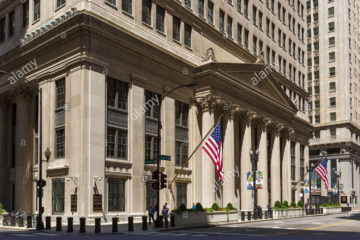Matt Levine’s Money Stuff: China Stocks and Bank CEOs

©2016 Bloomberg View
O0L5F36KLVRB
(Bloomberg View) — So how’s China?
Here’s One of the All-Time Great Stock-Price Charts:
That’s the chart of Beijing Baofeng Technology Co., which went public in China last March and went up by the daily 10 percent limit for 28 straight trading days through May 5, a gain of just under 2,000 percent from its initial public offering price. It was not alone in its discrete perfection; in April, the Financial Times noted that “Every one of the 29 IPOs in Shanghai and Shenzhen this month have risen by the daily limit each day since.”
Well, you live by the limit-up, you die by the limit-down, and here is a less pleasing chart: That’s the Chinese CSI 300 stock index today, and it offers a similar discrete perfection: Stocks fell by 5 percent, were halted for 15 minutes, fell again to the 7 percent threshold, and were cut off for the day, all in just 29 minutes. “So far this year — just four days — the blue-chip CSI 300 index is down 12 per cent,” and my joking suggestion about a down-20-percent meta-circuit-breaker that would cut off trading for the year is looking more appealing. Or maybe it isn’t, I don’t know, the existing circuit breakers don’t seem that popular: Critics say the mechanism may be amplifying losses, as investors rush to exit their positions for fear of being trapped in the event of a trading halt.On WeChat, the widely-used messaging and social network platform, a joke circulated: “Many people ask, ‘What is the circuit breaker mechanism?’ Actually it’s like this: You bring Rmb3,000 to play mahjong, but you lose it all in half an hour. The game is paused for 15 minutes so you can pop downstairs to the ATM to withdraw another Rmb5,000. You come back and quickly lose that too. Then the winner says, ‘Your luck is too bad, let’s just end the game for today’.”
Morgan Stanley
Yesterday Morgan Stanley announced that it had “appointed Colm Kelleher President of the Company,” making him the sole number 2 behind James Gorman, and that Greg Fleming would be leaving the company. Fleming is “one of Morgan Stanley’s most senior leaders” and a plausible bank CEO, but with Kelleher apparently ahead of him in line for succession, and “after CEO James Gorman indicated he plans to stay on at least five more years,” Fleming apparently concluded that his chance to run Morgan Stanley has passed: The situation is likely to feed the growing unease on Wall Street described by recruiters in recent months: Managers see a logjam ahead of them, blocking promotions they think they deserve. And it reaches to the top. CEOs at five of the six biggest U.S. banks already have held their posts at least six years and haven’t publicly signaled any intent to leave soon.
You could read this as a sign that efforts to make banking boring have had an effect: The big banks are now sort of a peacetime army, and career volatility is down. The chances of making a fortune are down, the chances of blowing up are down, it is more of a job and less of a constant struggle for power and glory. The true sign of success in making banking boring will be if everyone stays for 40 years, retires at 65, and doesn’t fight too hard for promotion.
Private Banking
Yesterday JPMorgan agreed to pay $4 million to the Securities and Exchange Commission “to settle charges that it falsely stated on its private banking website and in marketing materials that advisors are compensated ‘based on our clients’ performance; no one is paid on commission.'” In fact: JPM Private Bank Advisors were not paid commissions but instead were paid a salary plus a discretionary bonus that took into consideration a number of factors. None of the factors JPMS used to determine the discretionary bonus were tied to portfolio performance as advisor compensation was not based on the performance of the investments in customer accounts. I guess that makes sense? Like, you’re a private banker, not a mutual-fund manager, and you don’t have control over performance; if you recommend good stocks and your client says that he’d rather put all his money in Cynk, are you going to stop him? Though it feels maybe a little awkward that none of the compensation factors for investing advisors had anything to do with investing performance. But JPMorgan sometimes said its advisors were paid for performance, in places like “a private banking website for JPMS’ Tampa regional office” and some … cards: In March 2009 the Compensation Misstatement appeared in a JPM Private Bank document known as the U.S. Private Bank About Global Wealth Management prospecting card (“Prospecting Card”). The Prospecting Card was an index-sized card containing key points about the JPM Private Bank which was disseminated to Advisors within the JPM Private Bank to be used with current and prospective customers. The Prospecting Card was part of a wallet kit which could fit a handful of index-sized marketing materials, including a trust and estates card, an investments card, and the Prospecting Card. The Prospecting Card was a new concept developed and launched by JPMS in March 2009 during the financial crisis. The Prospecting Card was considered a “big deal” at JPMS as it was a marketing tool that could be distributed by Advisors to current and prospective customers during a time of financial market instability. If I were the JPMorgan lawyer negotiating this settlement I’d have offered to pay another million dollars in fines to take out the claim that a marketing index card was “considered a ‘big deal’ at JPMS,” which seems somehow like the most embarrassing part of the case. Though the whole thing is pretty embarrassing. “There was no allegation that the mistake made years ago was intentional or that any client was harmed,” says JPMorgan, and that’s true, but on the other hand people kept catching the error, and it kept not being corrected. It’s like JPMorgan’s advisers wanted to believe they were paid for performance, even though they knew they weren’t, so they kept writing it on cards. Elsewhere in private wealth management, Union Bancaire Privée agreed to pay the U.S. Department of Justice more than $187 million for facilitating tax evasion. And apparently the Internal Revenue Service is planning to offer “concierge-level service” to rich people. That phrasing comes from the IRS’s taxpayer advocate, who is worried about the poor people who will be denied the concierge-level service, though I am a little puzzled about why you would want concierge-level service from the IRS. I want, like, Amazon-level service from the IRS: efficient but unobtrusive.
Merger Lawsuits
I assume by now that everyone knows the drill with merger lawsuits: After a merger is announced, plaintiffs’ lawyers immediately race to sue, claiming that the deal was too cheap and that the target’s board of directors violated its fiduciary duties in agreeing to sell. Sometimes this is true, but only as a random accident, because every deal generates an immediate copy-and-paste lawsuit. (In 2014, for instance, 93 percent of deals were challenged.) And if the lawyers don’t find any wrongdoing, they settle the case for some trivial disclosure changes and a six-figure lawyers’ fee. The shareholders get nothing, the companies get some immunity from future lawsuits, and the lawyers collect their “merger tax” and move on. Or that was the drill, but over time it has become so obviously tawdry and embarrassing that Delaware Chancery Court – – where most of these cases are filed — has gotten up on its hind legs and said “enough,” and is starting to reject disclosure-only settlements that would pay lawyers but do nothing for shareholders. The revolution was sparked by Vice Chancellor J. Travis Laster, and “since Oct. 1, just 34% of mergers have been challenged, after Mr. Laster began aggressively shooting down settlements.” Here’s a plaintiffs’ lawyer:
“The heyday of ‘file a case, make $500,000’ is clearly over,” said Seth Rigrodsky, a plaintiffs’ lawyer based in Wilmington who brought the Dyax case. He said his firm will “continue to pursue cases where we can make a difference for stockholders.”
That is … sort of an amazing thing to say, to a reporter, on the record? I mean the stereotype was certainly that plaintiffs’ lawyers were not trying to make a difference for stockholders, but were just filing cases to collect their $500,000. But the plaintiffs’ lawyers aren’t supposed to admit that.
Bond Rigging
The International Financing Review has more details about the U.S. Department of Justice investigation into possible price-rigging of “supranational, sub-sovereign and agency bonds, or SSAs,” which apparently involves four traders at Bank of America, Credit Agricole and Credit Suisse. It seems to be a hard life, trading SSA bonds: “I really would not want to be a secondary trader [of SSA debt] right now. You have one or two big investors who are dictating prices in the market,” said one SSA syndicate official. “So if you can speak to another trader and agree to sell a bond at a certain price and not below, then that makes a big difference.”
Doesn’t that make you feel a little bad for them? If there’s really only “one or two big investors who are dictating prices” on one side, and a bunch of banks on the other side, then it’s hardly even “rigging” for the banks to band together against the investor(s). It’s just leveling the playing field. It’s, like, unionizing.
On the other hand, here is a story about a U.K. Financial Conduct Authority investigation into “possible manipulation of the British government-bond market by traders at Lloyds Banking Group PLC,” which is weird for opposite reasons. The FCA “is examining in part whether Lloyds traders sought to increase their profits by driving down the prices that the British bonds, known as gilts, fetched in government auctions or by artificially inflating their prices when the bonds were sold on to other investors,” but “the investigation is currently focused on individual traders at Lloyds and isn’t a broader industrywide probe into the massive gilt market.” It would be a bit alarming if one bank could on its own do much to drive down the auction price of U.K. government bonds.
Revolving Doors
The Wall Street Journal checked in with former TARP Inspector General Neil Barofsky, who is now working on a fun regulator-ordered assignment pestering Credit Suisse for documents about tax evasion or whatever. The assignment was supposed to run for two years, but they didn’t get him the documents fast enough, so he gets to extend his stay. “Mr. Barofsky’s term is being paid for by the bank,” and “Mr. Barofsky is based in New York, and Credit Suisse funds regular trips to Switzerland, where he stays at upscale hotels at rates negotiated by the bank.” There is a theory of the regulatory revolving door in which regulators will want to go easy on banks to set themselves up for cushy jobs at those banks after they leave public service. I do not particularly believe that theory in general, but in any case Barofsky complicates it in interesting ways: If there are lucrative post-regulatory private-sector careers that involve afflicting banks, at their expense, rather than working for them, then the incentives of regulators do seem to shift.
People are Worried About Unicorns
“Will Silicon Valley’s ‘unicorns’ gallop off a cliff in 2016?” asks this CNBC article, and I should point out that people are trying to make “pegasus” happen (for companies raising a billion dollars in a funding round, or for a lifestyle unicorn), so perhaps in this metaphor when the unicorns gallop off a cliff the pegasi will take wing and survive. I don’t know. Elsewhere “San Francisco’s largest taxi company is edging toward filing for bankruptcy,” which seems like an Uber scalp. And “Flatiron Health, a start-up that gathers and analyzes data on cancer treatments and sells software based on those insights, said it had raised $175 million in a funding round led by the pharmaceutical giant Roche,” as big corporates (like Roche and, previously, GM’s investment in Lyft) get into the unicorn- investing game.
And:
The number of private capital funds raising money from investors is on the rise, and the amount they are seeking to raise is a record $946 billion at the beginning of the year. That surpasses the previous high-water mark in terms of fund- raising goals set at the beginning of 2009, according to new data from Preqin.
People are Worried About Bond Market Liquidity
Here is “Confessions of an All-to-All Trading Advocate,” in which Larry Fondren, who was involved in “introducing and operating the first electronic platform for all-to-all corporate bond trading in the 1990s,” commissioned a survey of investors about why, decades later, “only 20% of investment-grade and 6% of high-yield transaction volume is traded electronically by institutional investors in the U.S.” “That research indicated participant concerns regarding the consequences of disintermediating dealers, high fees and costs, small transaction sizes, and potential information leakage, among others.”
Things Happen
Starboard Delivers Letter to Yahoo’s Board of Directors. Yahoo Said to Propose Job Cuts as Part of Mayer’s Revival Plan. Terry Lundgren Contends With Activist Investors at Macy’s. Pimco’s Flagship Bond Fund Took in Money in December. “Unconstrained bond funds are actually constrained in terms of the purpose investors are using them, because if you’re running an unconstrained fund you probably know investors are looking to avoid rate risk.” “As anyone who has been to a speed-dating night can attest, losers are common.” Why a Shrinking Stock Market Has Been Good to Investors. Barclays Plans to Close Most of Its Asia Cash Equities Unit. John Herrman onTwitter10K(Iam more optimistic). BlackBerry Joins Self-Driving Car Race With Its Own Software. “Contrary to the regulators’ intentions, in neither crisis short-selling bans were associated with increased bank stability: upon being subject to a short-selling ban, financial institutions featured larger stock price drops, return volatility and probability of default, these effects being larger for more vulnerable banks.” “There’splenty wrong heretoo, not least of which is a hedge fund manager opting to benchmark his performance against the Standard & Poor’s 500 Index.” A Machine Learning Model for Salary Estimation. Phantom liquidity at StubHub. How the Daily Fantasy Sports Industry Turns Fans Into Suckers. Possible future U.S. president Donald Trump got in aTwitter fight about golfwith Samuel L. Jackson because of an article in anin-flight magazine. PuddleWatch. Futuristcocktails. Black-markethay.
This column does not necessarily reflect the opinion of the editorial board or Bloomberg LP and its owners.
To contact the author of this story: Matt Levine at mlevine51@bloomberg.net To contact the editor responsible for this story: Zara Kessler at zkessler@bloomberg.net
For more columns from Bloomberg View, visit http://www.bloomberg.com/view







No Comment